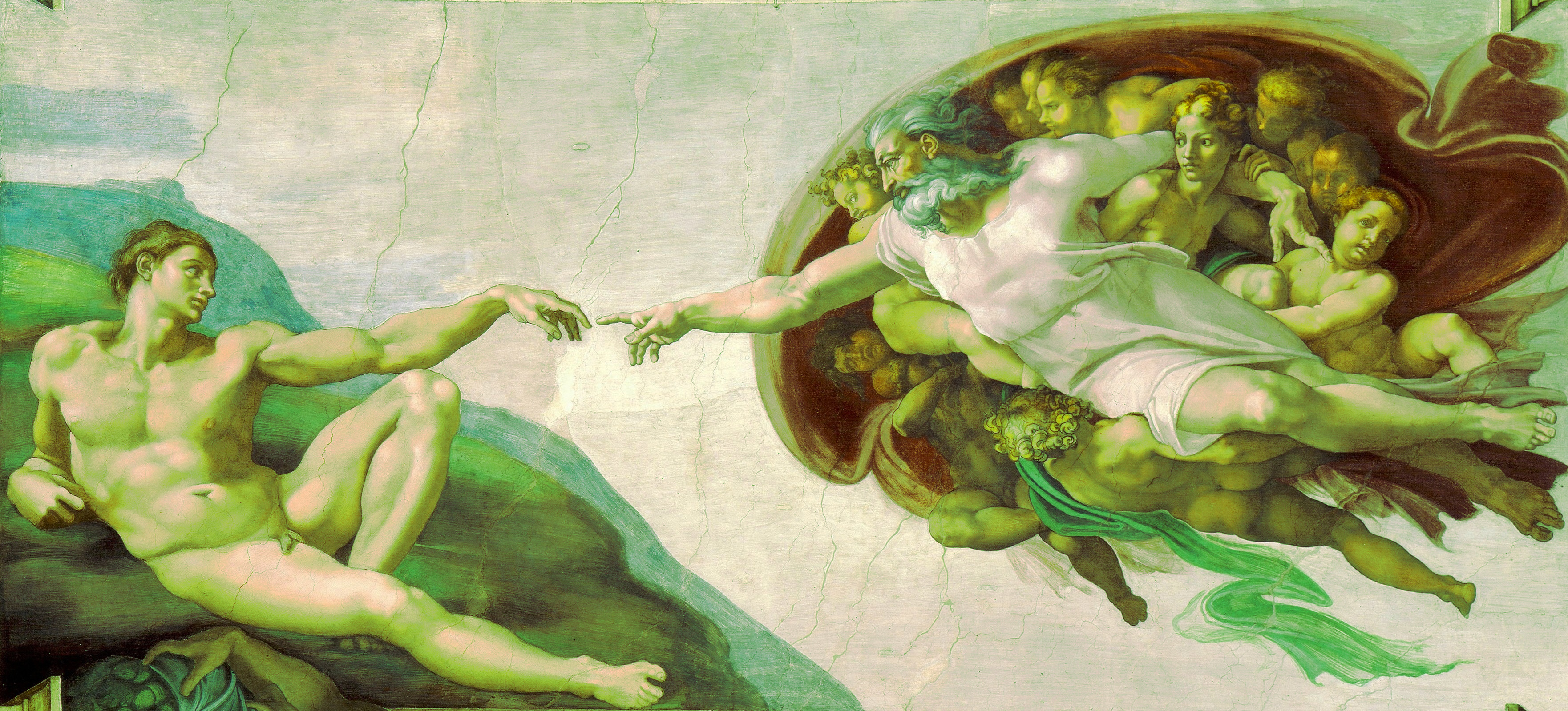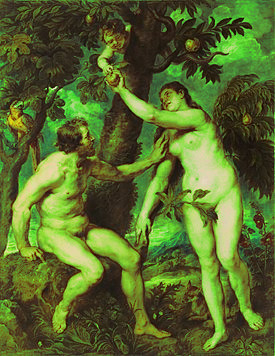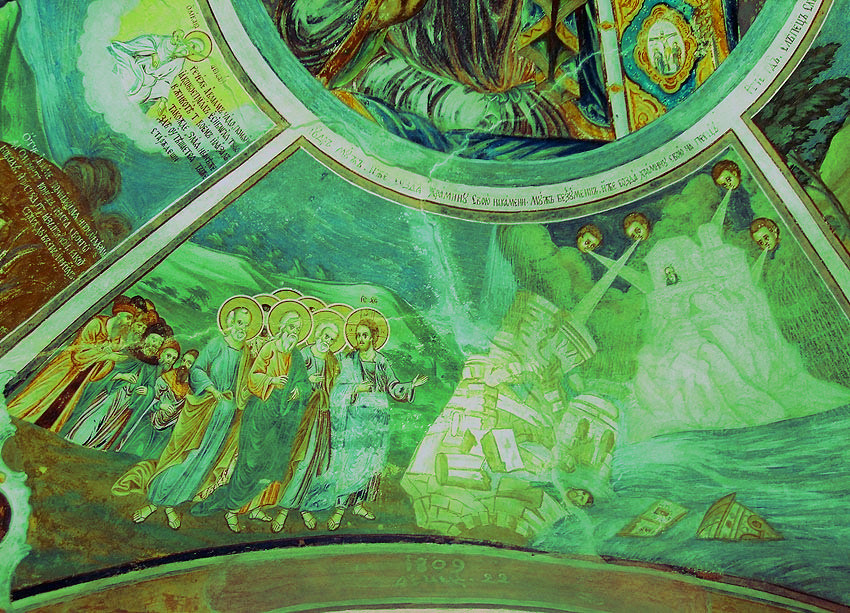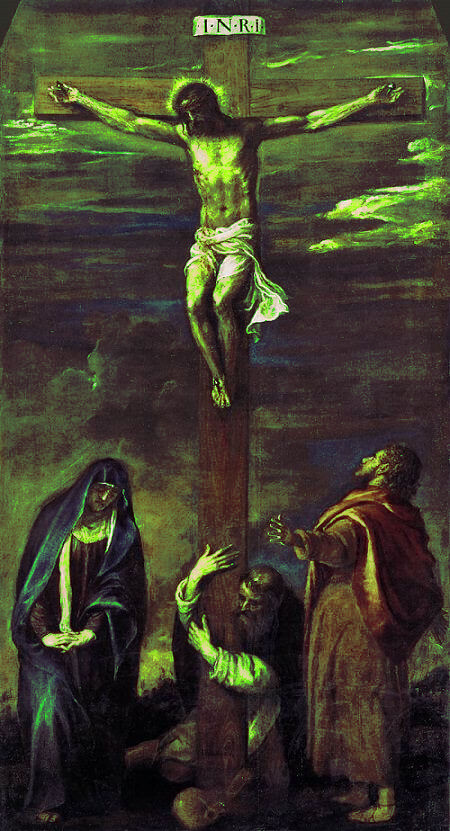
§0 A Will To Power

"For the uncomfortable truth is that we, we men, are and have been the ones causing, needing, participating in, wars and conflicts. We - not women - are the cause of most of the suffering, death, destruction, hate, violence, brutality, and killing, that has occurred and which is still occurring, thousand year upon thousand year; just as we are the ones who seek to be - or who often need to be - prideful and 'in control'; and the ones who through greed or alleged need or because of some ideation have saught to exploit not only other human beings but the Earth itself. We are also masters of deception; of the lie. Cunning with our excuses, cunning in persuasion, and skilled at inciting hatred and violence... (Quote continued at §2)
0.0 The ability to choose separates us from the animals. This dogma is Atlas ― the titan holding up the sky. The Abrahamic God did not deny Adam the ability to eat from the tree of the knowledge of good and evil as by denying choice he would be stripping away his humanity.
0.1 There are hardly any actions that Man can make that does not have an effect on everyone around him. The choice to not manage his weight will bear down on those around him. As will drug abuse. As will ignoring those who love him. But the ability to choose the wrong path and to impact others — to influence the world around him in a bad way — the burden to having to restrain oneself from cutting himself and those around him is a horrible necessity to LIVE.
0.2 When Man becomes a cog in the machine, the optimal path given to him on a sheet of paper by those on high who say they know best of how to protect him and those around him from himself, he not even allowed have a say in his love or children ― then he is is denied of his birthright to affect the world around him. Man ‘made in the image of God’ has an urge to create, to mold some of his surroundings to his will ― he has a will to power?
0.3 When Man is denied the world around him then he tends to either try to escape the world or becomes an anarchist. Anarchy is a product of suffocation. It's hell when we are forced to smile!
0.4 The correct choice made required sucks a little life from those who did the act under their own volition. They feel robbed of their impact on the world, their little dent in history. Their righteous act is stripped of merit; becomes almost indistinguishable from acts done because of force or coercion. The only thing they are left with is "no one had to tell me to do it". This stripping away at the ability to make an impact on the world has always been the reason why Man becomes unsatisfied with life. Requirements to do the right thing feel not only damaging to the people it targets but to those that were going to do it anyway.
0.5 Moving of decisions to higher levels causes more to feel the need to get involved at the higher levels. Many identify that making a mark on the world is what gives them meaning ― because this desire is not fulfilled by the ability to have an effect on the immediate world around them then they connect themselves to larger things that do. When a society is run like ‘Skinners box’ than many feel the need to be at the control panel. Some in power outright say that they got involved in the game because they wanted to have a greater impact (e.g. "wanted to help people").
0.6 A tragedy since most will live a more fulfilling life in their own small communities playing out their own small stories handling problems personally than playing in these faceless-sterile political games. When decision making is moved from small communities to higher institutions and their universal rules then agency is taken away from individuals and small communities. Everyone intuitively understands how toxic politics is and being forced to care about it is hell. But it is a hell ― the same one as the one where we are forced to smile ― that we are heading full-speed towards.
0.7 But how does one preserve free will if MAN makes choices that badly damage others or even himself? How does one preserve free will when Man chooses to abuse his family, rape his wife, kill his neighbor, destroy his body ― to manipulate other with his words for his own ego? How does one preserve agency when Man chooses to waste his life watching a screen or shooting heroin?
0.8 Perhaps this age of Man was always to end and we should not morn it nor the crumbling of the sky and the heavens that will follow ― this fall will bring forth something new?
§1 Rocks & Stability

1.0 Inconsistent creation and enforcement of narratives causes trauma. Many are at a loss on how to build their small stories ― their stories with their love and family ― when everything around them is in constant flux. They do not know what will be taken away from them tomorrow nor what will be required of them. Things they thought were rock-solid were demolished for the sake of wars and goals. So they don't build ― they can't! ― they forget the future and focus on the stories and impulses of today and maybe tomorrow. The damage is aesthetic, not easily measured or defined. Soul-crushing and debilitating all the same.
1.1 A type of damage not easily repaired; memories of how quickly it can all be taken away are slow to fade. Why start a relationship if one will be unable to meet his love because of travel restrictions, why start a family if one doesn't know if he will be able to provide through an economic crisis, why start a company if it can be shut down and dismantled in a day, why save if things can't be purchased later. The focus from long-term to short-term stories is quick but the other way around takes time, trust, and stability. There will be hesitancy to start building again when the rocks that were built on were smashed into shifting sand by those who thought that they knew better.
1.2 Maybe it is secondary if what is built on is perfect or even ‘true’ (true is a tricky word)? It is vital that what is built on is a rock: That what is built on will not easily move and only slowly erode and change form. If one wants to study to become a doctor then he first has to believe that there will be food for him tomorrow, that the roof over his head does not collapse, that the university will be open next year, that he will be able to travel there, that they will judge him consistently, that they will commit to training him for the entire duration, that others will trust his piece of paper after everything is said and done. None of these things may be fully justified but saying that they are enables the ability to plan for the future. Basic taboos are needed for stability. That they are not broken is an end to itself.
1.3 If it were so easy that narratives could be simply rolled back to undo the harm. The image that institutions can come in and do who-knows-what at any time will be burned into minds and will shape future decision making of individuals trying to plan out their lives. Breaking of taboos is much more notable than the effects of the narrative change iteself because it expands on things people have to account for and introduces uncertainty on what will not be overturned. There are expectations about what can and not happen that people build on that when played with leads to people feeling that they are unable to plan for the future. Trust is easily broken but only slowly regained.
§2 Imitation & Hierarchy

(continued from §1) ...and yet we men have also shown ourselves to be, over thousands of years, valourous; capable of noble, selfless, deeds. Capable of doing what is fair and restraining ourselves from doing what is unethical. Capable of a great and a gentle love [...] This paradoxy continues to perplex me. And I have no answers as to how we might change, reform, this paradoxical φύσις of ours, and so - perhaps - balance the suffering-causing masculous with the empathic muliebral and yet somehow in some way retain that which is the genesis of the valourous. And if we cannot do this, if we cannot somehow reform ourselves, can we terrans as a species survive, and do we deserve to?" ―David Myatt
2.0 The question how to preserve the ability to choose if Man engages in destructive activities is profound. A common answer is that we can't: Either the ability to engage in destructive activities does not follow under free will or that the choice necessarily infringes on others free will. Institutions need to take some power away from us to maintain stability; God "bestows some of our power to higher authorities" to protect us from ourselves.
2.1 With the advent of Platonism and the principle of imitation ― the acknowledgement that Man tends to construct his stories from those he is exposed to ― there has been another strategy, one that preserves agency: The promotion of narratives that lead souls to choose paths that are empathetic and edifying while discouraging impulsive and selfish actions. Protecting ourselves and others with good constructive stories: The promotion of figures of imitation that represent construction and creation while censoring figures that want to destroy and smash.
2.2 The creation of hierarchies to order what figures are virtuous and which are less so. The higher up one is on them the more are naturally drawing from him; the more of an obligation he has to watch his behavior. If one is living creation, virtue, bravery, compassion, impulse control ― he is promoted higher in the hierarchy to empower more people around him. If one engages in impulsive or destructive behavior, self-humiliation, self-harm, whining, victimhood ― his position is reduced to mitigate the harm.
2.3 A leader is the one in front of the pack that the steps of which are followed by those behind him. If one refuses to be a figure of imitation while holding power then he must be reorganized to a lower position. Suits and ties should be worn and those caught in scandals must resign.
2.4 Who should be at the top (the summit) of this hierarchy? A figure that is the most perfect form possible; free of all sin and vices so that all under him can be unrestrained as to who they can become. Christians are followers (imitators) of Christ.
2.5 There are situations where acts themselves may need to be regulated but the humane priority ― almost by definition ― is that which preserves our ability to choose. Agency is an integral part of the exertion of power (or creation) process.
§3 A Slave To Stories

3.0 In modernity some hold that one can be free from narratives through rationality. This is nonsensical as one cannot live outside of narratives as one constructs the world through them. One always exist in one narrative or another and there is not a neutral position seperated out from where to do the logical calculus on what the correct course of action should be. Each word, category, object has a little story ― structure ― inherent to it and to remove the story is to remove the object.
3.1 Some narratives may focus on mechanics and parts (science), others on the stories of a people (history). Its been argued that a few of these narratives are universal based on ways the world is or must be constructed (metaphysical). Or maybe all narratives have always been fairy tails that we tell ourselves to sleep at night and it was always ‘turtles all the way down’ (relative).
3.2 But if it is the cast that we are in part simply are choosing to construct the world in certain ways in some circumstances then in those circumstances one should draw from edifying stories. Truth is a tricky word, but a story that seems to maximize our creative potential is true in the sense that to give us an outcome that is universally desired. This type of purposeful (in modernity perhaps called ‘cybernetic’) truth may be the only universality we have access to.
3.3 Not being a slave of Christ will necessitate imitation from other narratives or figure. These ― not perfect ― will have flaws that when imitated will limit the creative potential of Man. Believing in any other set of stories is tangential to the form of Christ.